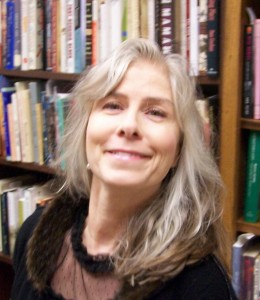 Cary Holladay grew up in Virginia. She is the author of five volumes of fiction, including A Fight in the Doctor’s Office (Miami UP 2008) and The Quick-Change Artist: Stories (Swallow Press / Ohio UP 2006). Her work has appeared in New Stories From the South: The Year’s Best. Her awards include an O. Henry Prize and fellowships from the Pennsylvania Council on the Arts, the Tennessee Arts Commission, and the NEA.
Cary Holladay grew up in Virginia. She is the author of five volumes of fiction, including A Fight in the Doctor’s Office (Miami UP 2008) and The Quick-Change Artist: Stories (Swallow Press / Ohio UP 2006). Her work has appeared in New Stories From the South: The Year’s Best. Her awards include an O. Henry Prize and fellowships from the Pennsylvania Council on the Arts, the Tennessee Arts Commission, and the NEA.
She teaches at the University of Memphis, where she is Director of the River City Writers Series and a First Tennessee Professor.
Interview with Cary Holladay
Superstition Review: In your story, “Land of Lightning,” why did you decide to use Tinsley’s voice for the narrator?
Cary Holladay: Because Tinsley has lost so much—his wife, his marriage, his daughter. All of that grief has tested his strength of character and has brought him to a state of wondering—about being a husband, being a father, and what it means to send your daughter off to war.
SR: Burton Laughinghouse is a name and a character that really sticks out in the story. Why did you decide that the name would be fitting for him? How does it embody his character?
CH: “Laughinghouse” is a name I heard or read somewhere and was captivated by. I have a weakness for unusual names, but using them in a story can be risky, like a joke. The name embodies Burton Laughinghouse’s character in an ironic way; he’s playful but selfish, a disruptive force, a con man. His love of birds is real, but he exploits the people who befriend and assist him.
SR: There is an element of religion in the story when the characters speak of God, praying, and the devil being present in Glenna’s life or when the devil was asked to leave. What do you believe it brought to the story and what importance does religion have for the characters?
CH: It’s such a part of them that they feel the pull of its compass no matter what they do. Glenna, especially, feels the burden of her sin for having injured Ned Page. She feels guilt for being attracted to Burton Laughinghouse. Religion is part of the personal mystery that these characters carry with them.
SR: The incident with Glenna Dancy and Ned Page with the arrow was briefly mentioned in the beginning of the story but is really brought to life at the end. Tell us why you decided that this story would make for a perfect ending. What way did it tie the whole story together?
CH: That incident grew out of the fear I felt in high school archery class. A bow and arrow is a powerful, primitive, effective weapon. To aim and let that arrow fly at a living target is to pronounce a death sentence, or at least pose severe danger. The scene tied the story together because it expressed the contradictions in Glenna’s tormented inner self—her sexuality, her anger, her ego. She’s combative. Like Tinsley’s daughter who died in a helicopter accident in Iraq, Glenna has a warrior’s heart.
SR: What are you writing now? What are you reading?
I’m finishing a collection of stories set in Virginia’s horse country and have begun writing a novel about the pirate Blackbeard. I’m reading buccaneer legends, lore, and history.